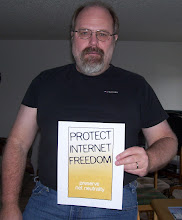 Muraco Kyashna-Tocha, 48, of Seattle, has grown marijuana legally since 1999. Kyashna-Tocha has had five neck and back surgeries and said that using marijuana manages her pain enough so she can engage in daily life. Photo by Chris Joseph Taylor/The Seattle Times
Muraco Kyashna-Tocha, 48, of Seattle, has grown marijuana legally since 1999. Kyashna-Tocha has had five neck and back surgeries and said that using marijuana manages her pain enough so she can engage in daily life. Photo by Chris Joseph Taylor/The Seattle Times Medical marijuana activist Steve Sarich of CannaCare
Medical marijuana activist Steve Sarich of CannaCarePot-phobic cops are on the verge of eviscerating Washington's medical marijuana law, rendering the law almost useless in protecting the sick and dying patients who use physician-approved cannabis to relieve their suffering.
Some of us had hoped that the DOH's medical-science-based recommendations would be the sole factor in determining permissible amounts of marijuana. But in an act of startling political cowardice -- and in what appears to be a legally questionable move -- Gov. Christine Gregoire appears to be caving to political pressure from law enforcement.
Medical science should have the last word on medical treatments, period. Medical marijuana is legal in the state of Washington. Why then, does law enforcement seem to have veto power over the Department of Health?
Law enforcement officials seem unwilling to give up the kind of power they've enjoyed over medical marijuana users. They obviously have a big problem with pot and with people who smoke it -- even under the advice of a physician.
This type of antiquated, narrow-minded, judgmental moralism is especially unattractive when it is directed at the sick and dying.
It seems Gov. Gregoire has chosen what she believes is politically expedient over the welfare of suffering patients. She has chosen to appease law enforcement's irrational distaste for, and superstitious fear of, marijuana -- even if that means people who are already have enough to worry about with their health have to also worry about having their doors kicked in by heavily armed, gung-ho narcotics units.
Last year, when the Washington Legislature mandated that by July 1, 2008, the Department of Health (DOH) would define what constitutes a "60-day supply" under the state's medical marijuana law, four workshops were held at multiple locations statewide to solicit input from patients, caregivers, doctors, and law enforcement. Hundreds of people offered their input, DOH officials studied the results and made their recommendations, and recently, after a Freedom of Information request from CannaCare activist Steve Sarich, those numbers became public.
The Department of Health recommended that patients (who must have "terminal or debilitating conditions" and a physician's recommendation to qualify) or their caregivers be allowed to possess up to 35 ounces of marijuana and bed allowed a plant-growing area of 100 square feet.
These guidelines are based on what is already a compromise between medical science and law enforcement concerns. A primary objective was to end the conflict between medical marijuana patients and over-zealous law enforcement officials, who persisted in arresting many patients despite their supposed protection under the law.
And according to medical cannabis researcher Sunil Aggarwal of the University of Washington medical school, even that amount is actually too low. Aggarwal says the DOH used an incorrect multiplier. Because "oral administration" (eating) of marijuana is less efficient than smoking, the limit should be 71 ounces, not 35 ounces, for a 60-day supply, Aggarwal said.
The 35-ounce amount is more than permitted in some places where medical marijuana is legal, but less than in others. Oregon allows 24 ounces of usable marijuana and six mature plants, while limits in California counties and cities range from 8 ounces to 3 pounds in Humboldt, Santa Cruz and Trinity counties, the Health Department's memo said.
Meanwhile, despite the fact they've been demanding that the state define the limits, ("We don't care what the number is, just give us a number"), law enforcement officials now say they are unhappy with the DOH recommendations, and want to define the limits themselves.
According to activist Sarich, Gov. Gregoire released the DOH recommendations to law enforcement before their public release. "Law enforcement had a fit and the whole hearing process came to a dead stop," Sarich said.
Sarich said the Governor then had DOH Secretary Mary Selecky come up with a plan to have a secret meeting including members of the law enforcement community. "Bill White, the DOH deputy director, informed me of this meeting and told me that Karen Jensen was in charge of organizing this meeting," Sarich said. "I spoke with Ms. Jensen and she confirmed that she was in charge of scheduling this meeting. She further informed me that this would be a closed meeting and that I was not invited. Mr. White told me that this meeting was being called in an 'attempt to bring patients and law enforcement closer together on the numbers'; Ms. Jensen confirmed this. Mr. White informed me that law enforcement was looking for 'an amount in the range of 1-3 ounces.' This is NOT up to law enforcement. This is not supposed to be a negotiation," Sarich said.
"The 35 ounces was not the number patients came up with. This was the number that the DOH came up with after holding four workshops and considering all of the medical and scientific evidence. This was exactly what they were instructed to do by the Legislature.
"This amounts to an illegal attempt to circumvent and subvert the legislative hearing process," Sarich said. "Robin Burkhart is in charge of scheduling hearings at the DOH and she confirmed to me that no hearing has been scheduled on the '60 day supply' issue. No one has even discussed it with her... This attempt by the Governor to derail the legislative process, and calling a closed door meeting, must be stopped. The legal process calls for the DOH to release their findings to the public and hold a public hearing on their proposed numbers. The Governor, through Mary Selecky, has stopped that legal process and we must ALL take the appropriate actions to see to it that the legislative process is not compromised."
When pressed by Seattle Times health reporter Carol Ostrum, law enforcement officials admitted that most would define the 60-day amount at three ounces; many would set it even lower.
Remember, law enforcement until now has been saying "let the Health Department set the number." But apparently, that's only workable if the DOH sets the number so low that law enforcement can keep busting and harassing patients.
Three ounces is NOT by any realistic measure a "60-day supply" for a medical marijuana user with even moderate needs. Many physicians, including my own, recommend 24 ounces as a 60-day supply, and for those patients who eat rather than smoke their medicine, the numbers are much higher.
In Ostrom's news story, she regrettably gives cops the last word, leaving Joe Sixpack with the idea that these disreputable medical marijuana patients are really just drug dealers in disguise.
The Seattle Times' Ostrum quotes a law enforcement officer as saying, "We don't want folks who are involved in the sale of drugs to be able to hide behind the medical-marijuana law." That argument is a complete red herring; it's as if the officer has never even read Washington's medical marijuana law, which is one of the strictest in the nation. Medical marijuana patients in the state of Washington must be very, very sick to qualify ("terminal or debilitating condition"), and must have a physician's recommendation.
To accuse these people of being "drug dealers" because they want to be able to keep an adequate supply of medicine on hand -- without having to worry about a SWAT unit invading their home -- is just about as low as you can go.
Can you see the stage being set for kicking in the doors of even more sick patients? Just call them "drug dealers" and throw them in jail. Nice work, Gov. Gregoire.
Now I can understand Steve Sarich's frustration when I talked to him at the May 3 Marijuana March in Seattle -- Sarich was sporting an "Anybody But Gregoire" button.
But to all appearances, medical marijuana patients don't have a better choice this fall.
Patients have seemingly been put in the position of choosing between "bad" (re-electing Gov. Gregoire) and "worse" (voting for her Republican rival, Dino Rossi, this November).
(If anyone has any indication from Dino Rossi's camp that he'd support the rights of medical marijuana patients, I'd be delighted if you could prove me wrong.)
Postscript: Gov. Gregoire discussed the DOH recommendations and medical marijuana limits with public radio station KUOW on May 22. You can hear her comments here.






























2 comments:
according to steve sarich at cannacare, dino rossi has told him many times that he will support the will of the people and work to help medical marijuana patients
(check out the cannacare forums if you want to read about it)
Also, the republican candidate for lt. governor is pro medical marijuana, yet the current democratic lt.governor is a notorious anti-medical marijuana advocate.
I'm a libertarian, so I'm not associated with either parties, just delivering facts.
Hi Gracen, thanks for the comment.
Steve Sarich told me he couldn't get Dino Rossi to make a public statement about medical marijuana.
Gov. Christine Gregoire, on the other hand, publicly supports 15 plants and 24 ounces, which is the current rule.
Are you telling me Rossi would support larger limits? If so, do you have a link to support that?
Rossi hasn't made ANY statement on medical marijuana, as far as I can tell. It seems exactly as if he is chickenshit to touch the issue.
Post a Comment